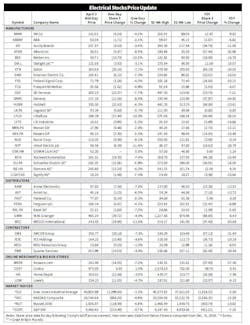Latest from Industry
Concerns with the Trump Administration’s tariff policies have spread quickly throughout the electrical industry, construction market, Wall Street and overall U.S. economy since the April 2 announcement of reciprocal tariffs. Over the past week, many blue-chip electrical stocks dropped by -20% or more, and at least one global trade analyst is now forecasting declines of at least that much in cargo shipped into the nation’s ports. It’s a fluid situation with much uncertainty over how many of these tariffs will stick or be negotiated down, but right now the tangible impact on the electrical market is serious.
Some electrical manufacturers have announced price hikes of 10%-plus, according to data posted by Fromm Electric, Reading, PA, to help its customers manage their purchases effectively as possible. Some of the larger price hikes posted on April 3 at www.frommelectric.com were for products from Edwards Signaling (+10%); Kidde (+10%) and Bussmann (+15.3% across all product families and higher increases for some more products with digital content).
Prices for electrical stocks have been all over the place since President Trump announced plans for reciprocal tariffs on April 2 (see chart below). Prices for some electrical stocks plunged -10% or more on April 3, and saw another big drop on the morning of April 9 before the President announced a 90-day pause on tariffs for many countries, China being the notable exception. Following the announcement of the pause, Wall Street enjoyed some of its biggest one-day gains ever, but on the following morning, the key market indices were all down at least -3%.
Over the past few years, the stocks of many of the larger publicly held electrical manufacturers, distributors and contractors have beat the market, but with all the overall uncertainty on Wall Street right now that’s the case. Some stocks that in recent months and years offered market-leading gains are down significantly. At press time on the morning of April 10, electrical stocks with changes in their 200-day moving averages topping -25% include Atkore (-37.7%); Littelfuse (-36.4%); Generac (-29.9%); nVent (-27.8%); Freeport McMoRan (-27.7%); and Mersen (-27.1%).
Distributors are speaking out about the impact on their businesses. In the EW/Vertical Research Partners Q1 2025 survey on electrical market business conditions, one respondent said, “Tariffs are a wild card. Some vendors have raised prices April 1, others are holding off. This will definitely impact sales.”
Prices of new homes are expected to rise because of tariffs, too, according to the National Association of Home Builders (NAHB), and it expects the average increase for a new home to increase by more than $9,000 (see the page 1 article in this issue on the housing market).
Electrical Association Officials Speak Out
According to several recent press releases, association officials in the electrical market generally support the Trump Administration’s policies to stimulate industrial growth in the United States, but they are urging President Trump to work with them on trade policies that won’t hurt their members’ businesses or profitability. While the National Electrical Contractors Association (NECA) said in an April 2 press release that it applauds President Trump’s intentions to strengthen American manufacturing and shares his vision for a more resilient domestic supply chain, it “remains mindful of the potential impacts that the newly announced tariffs may have on the electrical construction industry.”
“With a global supply chain integral to our work, increased costs on key materials such as copper wiring, transformers, work vehicles and electrical products could pose challenges for contractors, project timelines and infrastructure development,” NECA said in the press release.
“That said, we appreciate the Administration’s efforts to support American businesses and are encouraged that several key materials critical to the electrical construction industry — such as copper, semiconductors, steel, and aluminum — are not subject to these new reciprocal tariffs. Ensuring access to these essential goods at competitive prices is vital to the success of our contractors and the broader economy.”
NECA CEO David Long said in the release, “As these new tariffs take effect, we look forward to working with the Administration to ensure that electrical contractors and the entire electrical industry can continue powering America efficiently while navigating potential cost and supply chain challenges.”
In an April 3 statement in response to the Trump Administration’s announcement of a 10% tariff on imports from all countries and additional reciprocal tariffs for select countries, Debra Phillips, president and CEO of the National Electrical Manufacturers Association (NEMA), said, “The nation’s electrical manufacturers comprise one of the largest sectors of the U.S. economy, and our products serve as the backbone of our nation’s electrical system. The electroindustry has invested over $185 billion in domestic manufacturing since 2018, bolstering U.S. production of critical electrical products and creating thousands of good paying American jobs.
“As the second-largest U.S. exporter and second largest U.S. importer of manufactured goods, electrical manufacturers play a pivotal role in expanding the U.S. manufacturing base to secure America’s energy dominance and creating skilled trade careers for hard-working Americans.
“The North American electrical system powers economies and provides products and services essential in developing national infrastructure and increasing competitiveness. The industry is committed to continue its historic investments in U.S. manufacturing. We urge the Trump Administration to prioritize business certainty, U.S. competitiveness, realistic transition periods for moving key supply chains and minimizing the impact on critical manufacturing sectors. Trade policies must also ensure our nation’s manufacturers can continue producing critically needed electrical goods for a secure and reliable grid.
“Electrical manufacturers have one of the most complex global supply chains of any industry. NEMA will continue our commitment to domestic content in manufactured products through our Make It American program, helping NEMA members confidently bring Build America, Buy America-compliant products to market and supporting America’s workers, communities and businesses.
“The electroindustry supports the Trump Administration’s objectives to strengthen the U.S. energy system, expand our manufacturing base, and create good-paying American jobs, and we urge the Administration to work with NEMA and our partners across the electroindustry to create trade policies that will build on these objectives to achieve our shared goals.”
Wes Smith, president and CEO, National Association of Electrical Distributors, said in a post that association members should “remain flexible in what will be a fluid environment as negotiations ensue and progress.”
“Communication with suppliers is vital to managing inventory levels and pricing and in providing customers with the latest information to assist in sound business and investment decision making, he said. “NAED, along with our coalition partners, NECA, NEMA and the National Electrical Manufacturers Representatives Association will be a strong voice and advocate for the electrical industry and its importance to our economy and future.”










